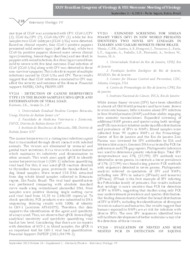Evaluation of nested and semi nested PCR in detection of equine infectious anemia virus infection in horses of Pantanal region, Brazil.
Evaluation of nested and semi nested PCR in detection of equine infectious anemia virus infection in horses of Pantanal region, Brazil.
Author(s): CAVALCANTE, R. V.; NOGUEIRA, M. F.; ARAÚJO Jr. J. P.
Summary: Equine infectious anemia (EIA) is caused by a retrovirus and its primary mode of transmission comprises transfer of blood from infected animals to healthy ones. In Brazil, EIA notification is mandatory and its confirmation is based in serological tests followed by euthanasia of infected animals. AGID and ELISA are serological techniques recommended because have good accuracy and reliable results for detection of positive animals; however, some cases may display false results. Based on that, the aim of this study was to evaluate nested PCR technique in samples from Brazil. We tested five combinations of these primers, using 12 DNA samples extracted from positive horses from Pantanal (endemic area) in both serological techniques.
Publication year: 2013
Types of publication: Abstract in annals or event proceedings
Unit: Embrapa Pantanal
Observation
Some of Embrapa's publications are published as ePub files. To read them, use or download one of the following free software options to your computer or mobile device. Android: Google Play Books; IOS: iBooks; Windows and Linux: Calibre.
Access other publications
Access the Agricultural Research Database (BDPA) to consult Embrapa's full library collection and records.
Visit Embrapa Bookstore to purchase books and other publications sold by Embrapa.

